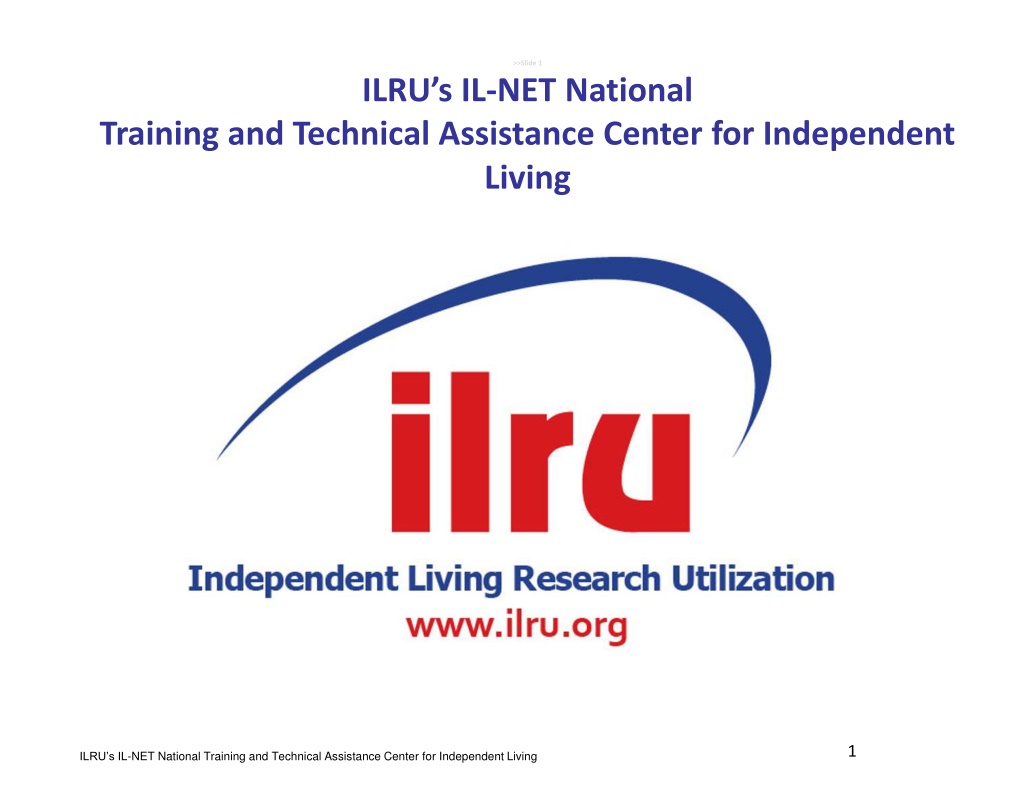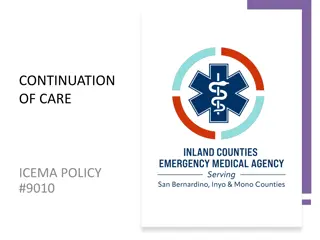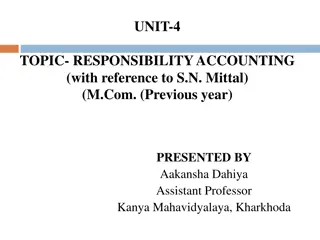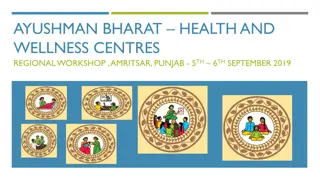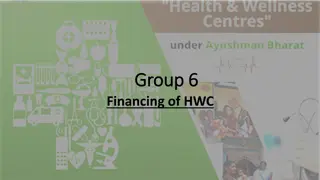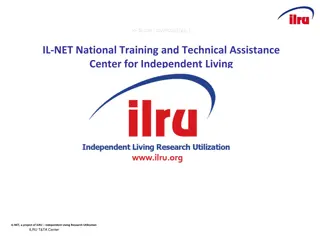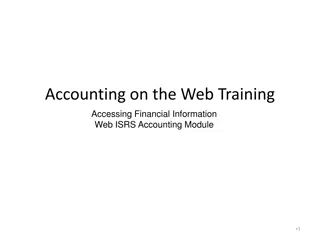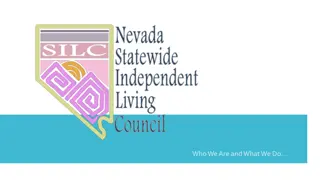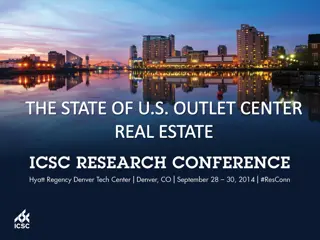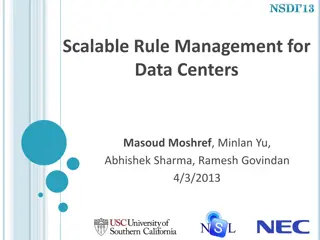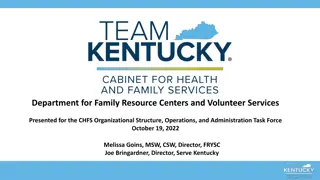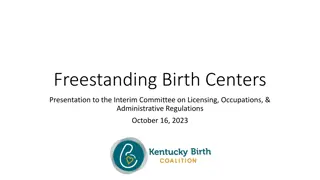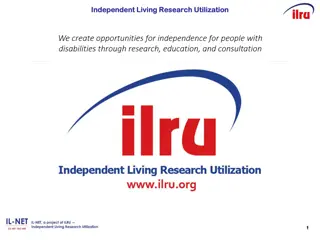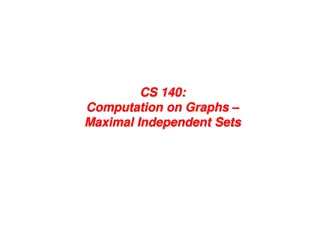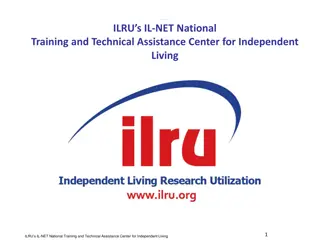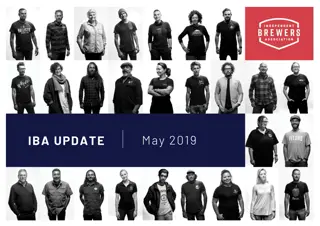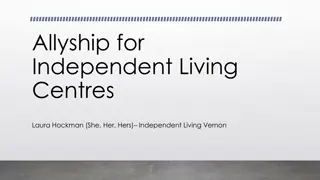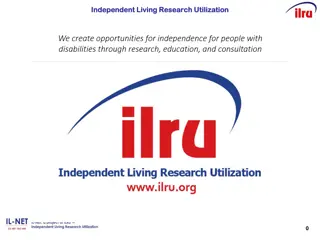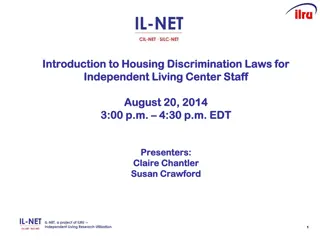Financial Management Training for Independent Living Centers
Learn about financial management best practices for Independent Living Centers, including internal controls, monitoring, audits, fraud prevention, budgeting techniques, allowable costs, procurement procedures, federal compliance, cybersecurity, and lobbying activities.
Uploaded on Sep 19, 2024 | 0 Views
Download Presentation

Please find below an Image/Link to download the presentation.
The content on the website is provided AS IS for your information and personal use only. It may not be sold, licensed, or shared on other websites without obtaining consent from the author. Download presentation by click this link. If you encounter any issues during the download, it is possible that the publisher has removed the file from their server.
E N D
Presentation Transcript
>>Slide 1 ILRU s IL-NET National Training and Technical Assistance Center for Independent Living 1 ILRU s IL-NET National Training and Technical Assistance Center for Independent Living
>> Slide >> Slide 2 2 Financial Management for Financial Management for Centers for Independent Living Centers for Independent Living Presenters: Presenters: John Heveron John Heveron Paula McElwee Paula McElwee 2 ILRU s IL-NET National Training and Technical Assistance Center for Independent Living
>> Slide >> Slide 3 3 Your Conference, Your Questions Your Conference, Your Questions What answers or insights would be worth big chunks of your life over the next few days? What good ideas have you heard at webinars, blogs, that aren t very easy to implement? What would make you feel more confident discussing financial matters with your board, funders, outside accountants, or your accounting staff? Note: This week s training is intended for Centers for Independent Living. SILC specific training is available at https://www.ilru.org/training/administrative-requirements- and-cost-principles-for-silcs-sub-grantees-15-hours 3 ILRU s IL-NET National Training and Technical Assistance Center for Independent Living Independent Living ILRU s IL-NET National Training and Technical Assistance Center for
>> Slide >> Slide 4 4 What You Will Learn What You Will Learn How to have good internal controls that will protect your assets and your reputation. How you can monitor to be sure that your controls are appropriate and working. How ACL/Office of Independent Living Programs (OILP) audits CILs and how to be prepared for those audits. What can go wrong in nonprofits and how to prevent it. What your responsibilities are for security. Techniques for developing a budget. How to request and document drawdowns, and advances. How to recognize and reduce fraud. 4 ILRU s IL-NET National Training and Technical Assistance Center for Independent Living Independent Living ILRU s IL-NET National Training and Technical Assistance Center for
>> Slide >> Slide 5 5 What You Will Learn, What You Will Learn, cont d. What costs are allowable and unallowable. How to distinguish direct from indirect costs. How to work with the cost allocation method you have chosen. What are proper procurement procedures. How to document your federal compliance and controls over compliance. How to greatly reduce the possibility of ransomware and other cybersecurity attacks. How to distinguish between advocacy and lobbying. What lobbying activities are permitted. 5 ILRU s IL-NET National Training and Technical Assistance Center for Independent Living Independent Living ILRU s IL-NET National Training and Technical Assistance Center for
>> Slide >> Slide 6 6 What You Will Learn, What You Will Learn, cont d. 2 What are the board s financial responsibilities. Where to find resources to help with policies and procedures. How to improve your understanding of nonprofit financial statements including some recent and upcoming changes. What annual and other filings are you responsible for. How to distinguish employees from subcontractors. Sub recipient monitoring (monitoring of Part B recipients by the DSE). How to simplify your accounting system. Where to get free stuff. 6 ILRU s IL-NET National Training and Technical Assistance Center for Independent Living Independent Living ILRU s IL-NET National Training and Technical Assistance Center for
>> Slide >> Slide 7 7 Key Definitions Key Definitions Nonfederal entity. That is your organization, organizations that receive federal funding but aren t part of the federal government. Sub-recipient/sub-grantee. If you receive Part B funds you are a sub- grantee of the Designated State Entity which receives the direct grant. Cost objectives. These are services or groups of services for a specific population. Modified total direct costs. These are a select group, but not all of your total direct costs. Indirect costs. These are any costs that are shared across all of your programs similarly, and smaller cost categories where direct assignment produces more effort than benefit. These may include shared salaries, occupancy costs like rent and utilities and smaller categories like supplies. 7 ILRU s IL-NET National Training and Technical Assistance Center for Independent Living Independent Living ILRU s IL-NET National Training and Technical Assistance Center for
>>Slide 8 >>Slide 8 Survey Survey What keeps you up at night? What areas of risk concern you? Here is a confidential survey for you to plug in your thoughts. 8 ILRU s IL-NET National Training and Technical Assistance Center for Independent Living Independent Living ILRU s IL-NET National Training and Technical Assistance Center for
>> Slide >> Slide 9 9 Environmental Risk for Nonprofits Environmental Risk for Nonprofits Each year the AICPA9(a)* highlights risks faced by nonprofits. Their most recent analysis included the following: A tight job market at a time of increased complexity and risk combined with budget concerns. Turnover as for-profits, schools, and hospitals hire away smaller nonprofit employees. These are exacerbated by complex accounting changes and continuous regulations. Defensive strategies may include increased salaries, professional development, building a strong culture, using outsourced accounting and finance resources. *(a) AICPA the American Institute of CPAs 9 ILRU s IL-NET National Training and Technical Assistance Center for Independent Living Independent Living ILRU s IL-NET National Training and Technical Assistance Center for
>> Slide >> Slide 10 Environmental Risk for Nonprofits Environmental Risk for Nonprofits, , cont d. 10 Software changes including software as a service-cloud-based programs. Who uses cloud-based programs? For what? Personally identifiable information needs to be protected. Outsourcing certain functions such as financial reporting, fundraising, and investing may help, but it is important to review service agreements to clarify responsibilities, establish timelines including response times, and to verify that the providers controls are appropriate. How can an organization check the quality of a service provider? SOC 1 reports? SOC 1 is an auditor s report that a service provider s service system and controls over that system are suitably designed. 10 ILRU s IL-NET National Training and Technical Assistance Center for Independent Living Independent Living ILRU s IL-NET National Training and Technical Assistance Center for
>> Slide >> Slide 11 Environmental Risk for Nonprofits Environmental Risk for Nonprofits, , cont d. 2 11 COVID-19 presents an unprecedented risk for all of us. Most of us have been working remotely or unable to work. New strategies are required for internal control in our new work- from-home environment. They start with communications and training. Provide guidance about having a good workspace and a routine. Make sure that critical software is available to staff. Consider collaboration software like Microsoft Teams. Be sure that all software is accessible. Follow nonprofit leadership organizations like techsoup.org as they provide tools and guidance for working remotely. 11 ILRU s IL-NET National Training and Technical Assistance Center for Independent Living Independent Living ILRU s IL-NET National Training and Technical Assistance Center for
>> Slide >> Slide 12 What ACL Expects and Audits For What ACL Expects and Audits For 12 ACL expects agencies to be compliant with Uniform Guidance as interpreted by HHS regulations found at 45 CFR part 75 They want to be sure that you have policies and procedures in place for: Resource development Procurement Travel reimbursement Hiring of key personnel Expense reimbursements 12 ILRU s IL-NET National Training and Technical Assistance Center for Independent Living Independent Living ILRU s IL-NET National Training and Technical Assistance Center for
>> Slide >> Slide 13 What ACL Expects and Audits For, What ACL Expects and Audits For, cont d. 13 They will also look at your processes for Budget development and review, Compliance with cost principles, Compliance with your indirect cost rate or other cost reimbursement procedure, Records retention, Securing property and equipment, Dealing with subcontractors and subrecipients, and Complying with the buy American and hire American Executive Order. 13 ILRU s IL-NET National Training and Technical Assistance Center for Independent Living Independent Living ILRU s IL-NET National Training and Technical Assistance Center for
>> Slide >> Slide 14 What ACL Expects and Audits For What ACL Expects and Audits For, cont d. . 2 14 Payroll hours worked, approved rate, and cost allocation documentation will be reviewed. Purchase orders may be reviewed. Vendor invoices/vouchers will be examined for evidence of proper review, approval, and allocation. Travel documentation including the purpose, the travel method, and travel reimbursement requests may be looked at. Your process for hiring key personnel including obtaining ACL approval will likely receive scrutiny. 14 ILRU s IL-NET National Training and Technical Assistance Center for Independent Living Independent Living ILRU s IL-NET National Training and Technical Assistance Center for
>> Slide >> Slide 15 What ACL Expects and Audits For, What ACL Expects and Audits For, cont d. 3 15 How do you allocate costs? Make sure shared costs are allocated or spread fairly among funding sources. 1. Approved indirect cost rate? 2. 10% de minimis? 3. Allocate everything directly? ACL/OILP will look at your methodology for allocating costs and make sure that what you are actually doing is consistent with your approved allocation process described in your indirect cost rate proposal. 15 ILRU s IL-NET National Training and Technical Assistance Center for Independent Living Independent Living ILRU s IL-NET National Training and Technical Assistance Center for
>> Slide >> Slide 16 What ACL Expects and Audits For, What ACL Expects and Audits For, cont d. 4 16 Agencies are expected to properly account for and protect property and equipment. ACL may look at your process for recording and tracking equipment. They may ask for evidence of a physical inventory of property and equipment. Prior approval for equipment purchases above $5,000 may be confirmed. 16 ILRU s IL-NET National Training and Technical Assistance Center for Independent Living Independent Living ILRU s IL-NET National Training and Technical Assistance Center for
>> Slide >> Slide 17 What ACL Expects and Audits For, What ACL Expects and Audits For, cont d. 5 17 ACL will check whether you were required to have a single audit based on your expenditures of federal awards, and whether you did it. This is based on federal expenditures, not grants income. The threshold is calculated on either the accrual basis, or the cash basis even though your accounting should be on the accrual basis. The current threshold is $750,000. With the addition of CARES Act funds, some CILs who were not required to conduct a single audit in the past will be required to do so this year. 17 ILRU s IL-NET National Training and Technical Assistance Center for Independent Living Independent Living ILRU s IL-NET National Training and Technical Assistance Center for
>> Slide >> Slide 18 Documenting Resource Development Activities Documenting Resource Development Activities 18 ACL may look at your resource development activities, since resource development is required of CILs in the Rehabilitation Act. Being allowed to use Federal funds for resource development is not only a requirement, it is an extremely rare opportunity. To successfully develop new resources you must be able to demonstrate funds used for this purpose result in outcomes. You may identify specific resource development procedures, and you must show them, such as: Meeting with local officials to discuss possible funding Meeting with corporations to discuss sponsorships Soliciting memberships Developing fee for service contracts in key areas Grant writing 18 ILRU s IL-NET National Training and Technical Assistance Center for Independent Living Independent Living ILRU s IL-NET National Training and Technical Assistance Center for
>> Slide >> Slide 19 Documenting Resource Development Activities Documenting Resource Development Activities, , cont d. cont d. 19 Board minutes should document goals and procedures for resource development. Your budget should reflect your expectations for resource development income and expenses. It is possible for costs to be higher and revenue lower in the early stages of resource development. Many activities can result in net losses in the early years. For example, grant writing expenses occur right away, but success may occur in the next fiscal year. You should be able to show the monetary growth of your resource activities, and eventually to show that all resource development costs have been recouped and more. 19 ILRU s IL-NET National Training and Technical Assistance Center for Independent Living Independent Living ILRU s IL-NET National Training and Technical Assistance Center for
>> Slide >> Slide 20 Surviving Funder and Other Audits Surviving Funder and Other Audits 20 Our experience is that if you demonstrate that you understand the key concepts, you will have a better result with funders when they audit your programs. The key areas you need to be knowledgeable about are: Internal controls over federal awards, Documentation for costs and cost allocation, and Procurement requirements. Your staff should also be informed about these rules They should be familiar with your policies, the specific procedures they are responsible for, and your resources. 20 ILRU s IL-NET National Training and Technical Assistance Center for Independent Living Independent Living ILRU s IL-NET National Training and Technical Assistance Center for
>> Slide >> Slide 21 The Updated Fiscal Procedures Manual The Updated Fiscal Procedures Manual 21 The Fiscal Procedures Manual can help with many of these requirements. It has been updated and is found at https://www.ilru.org/il-net-sample-fiscal-policies-and- procedures-handbook. Use as a starting point for you in evaluating your current policies, or for developing policies and procedures. Virtually all of the policy and procedures areas that ACL requires are addressed in this manual. Make sure you expand upon the policies to detail your written procedures including specific steps you will undertake to implement the policy that can be followed regardless of changes in staff. This often includes specific titles, references timelines, and indicates what internal forms to use. 21 ILRU s IL-NET National Training and Technical Assistance Center for Independent Living Independent Living ILRU s IL-NET National Training and Technical Assistance Center for
>> Slide >> Slide 22 The Updated Fiscal Procedures Manual The Updated Fiscal Procedures Manual, , cont d. 22 It is extremely important that you customize each of the policies for your own agency. ACL expects you to adhere to your policies, even if they aren t required. If you aren t compliant with your own policies, you will be cited for that! Federal funding requires compliance with regulations and also internal controls over your compliance. Your policies will be evidence of your controls over compliance. If these policies aren t implemented and functioning, they are irrelevant. 22 ILRU s IL-NET National Training and Technical Assistance Center for Independent Living Independent Living ILRU s IL-NET National Training and Technical Assistance Center for
>> Slide >> Slide 23 Review of the Fiscal Procedures Manual Review of the Fiscal Procedures Manual 23 After introductory material, the manual starts with board, staff, and consultant responsibilities. Are any of your board members unclear about their responsibilities? Do board members get involved in tasks that seem more appropriate for staff? What do you do to help them understand your agency? What do you believe are the board s responsibilities? Have you recruited board members for their expertise? A banker, CPA, or successful business owner who understands financial statements? 23 ILRU s IL-NET National Training and Technical Assistance Center for Independent Living Independent Living ILRU s IL-NET National Training and Technical Assistance Center for
>> Slide >> Slide 24 Review of the Fiscal Procedures Manual, Review of the Fiscal Procedures Manual, cont d. 24 What are the key responsibilities of: The Executive Director? The accountant/CFO? Your outside CPA? Are these written in policy or other documentation? 24 ILRU s IL-NET National Training and Technical Assistance Center for Independent Living Independent Living ILRU s IL-NET National Training and Technical Assistance Center for
>> Slide >> Slide 25 Review of the Fiscal Procedures Manual, Review of the Fiscal Procedures Manual, cont d. 2 25 The next section of the manual talks about internal controls. There are very specific procedures for access to records, segregation of responsibilities, receipts, disbursements, payroll, drawdowns, and expense allocation. You need to adopt your version of these internal controls to secure your assets and confidential information, protect your reputation, and have and prove you have controls over compliance. Your procedures should be very specific regarding how the duties related to fiscal procedures are assigned between staff, or if you are small, staff and board members. 25 ILRU s IL-NET National Training and Technical Assistance Center for Independent Living Independent Living ILRU s IL-NET National Training and Technical Assistance Center for
>> Slide >> Slide 26 What Can Go Wrong in Nonprofits? What Can Go Wrong in Nonprofits? 26 To understand the value of internal controls we must understand how things can go wrong. Improper transactions can include any of the following: Incoming receipts can be taken or deposited into an unknown account. Unexpected receipts (like contributions) pose more risk. Events where cash is collected are events where cash can be pocketed. Refunds can be generated and diverted by overpaying a bill or paying it twice. 26 ILRU s IL-NET National Training and Technical Assistance Center for Independent Living Independent Living ILRU s IL-NET National Training and Technical Assistance Center for
>> Slide >> Slide 27 What Can Go Wrong in Nonprofits? What Can Go Wrong in Nonprofits? cont d. 27 Kickbacks a personal payment to an employee for purchasing from or contracting with a particular vendor or contractor. Check signatures can be forged and improper payments made. Banks aren t great about verifying signatures. Phony invoices can be generated and submitted for payment. Payroll checks can be prepared for employees who no longer work for the organization or are fictitious. 27 ILRU s IL-NET National Training and Technical Assistance Center for Independent Living Independent Living ILRU s IL-NET National Training and Technical Assistance Center for
>> Slide >> Slide 28 What Can Go Wrong in Nonprofits? What Can Go Wrong in Nonprofits? cont d. 2 28 Fundraising events may involve cash, and internal controls may not be well-planned. This is inherently difficult because each event is unique. Internal controls should be part of your planning process. Credit cards can be used for improper charges, and credits can be improperly issued. Supply purchases can include personal items that are left in the trunk while the rest of order is brought in, unless someone checks the items against receipt. Inactive investment accounts are risky because they may not be carefully reviewed. Improper withdrawals may be unnoticed. 28 ILRU s IL-NET National Training and Technical Assistance Center for Independent Living Independent Living ILRU s IL-NET National Training and Technical Assistance Center for
>> Slide >> Slide 29 What Can Go Wrong in Nonprofits? What Can Go Wrong in Nonprofits? cont d. 3 29 Nonprofit Organizations face various risks in the form of fraud, disruption, theft, and errors on the part of insiders misusing technology to steal assets and personal information. Technology creates efficiency, but also creates opportunities for fraud. 29 ILRU s IL-NET National Training and Technical Assistance Center for Independent Living Independent Living ILRU s IL-NET National Training and Technical Assistance Center for
>> Slide >> Slide 30 What Can Go Wrong in Nonprofits? What Can Go Wrong in Nonprofits? cont d. 4 30 Either the payee or the amount is altered after a check is signed. Bank liability for improper checks diminishes when reconciliations are not timely. If a check forgery is not reported to the bank, the bank has reduced liability on subsequent forged checks. That increases your liability. Mobile banking fraud is becoming more common. Mobile devices must be secure. 30 ILRU s IL-NET National Training and Technical Assistance Center for Independent Living Independent Living ILRU s IL-NET National Training and Technical Assistance Center for
>> Slide >> Slide 31 Findings of Most Common Frauds Findings of Most Common Frauds 31 The Association of Certified Fraud Examiners identifies the most common fraud schemes. They are Billing schemes for fictitious goods, Improper benefits derived from a conflict of interest, Inflated or improper expense reimbursement, Overstated hours and fake employees, Theft of cash on hand usually small amounts over a long period of time, and Intercepting, forging or altering checks or electronic payments. 31 ILRU s IL-NET National Training and Technical Assistance Center for Independent Living Independent Living ILRU s IL-NET National Training and Technical Assistance Center for
>>Slide 32 >>Slide 32 Q and A and Break Q and A and Break 32 ILRU s IL-NET National Training and Technical Assistance Center for Independent Living Independent Living ILRU s IL-NET National Training and Technical Assistance Center for
>Slide >Slide 176 For More Information For More Information 176 Contact: John Heveron, Jr. john@heveroncpa.com Paula McElwee paulamcelwee-ILRU@yahoo.com 33 ILRU s IL-NET National Training and Technical Assistance Center for Independent Living Independent Living ILRU s IL-NET National Training and Technical Assistance Center for
>> Slide >> Slide 34 IL IL- -NET NET Attribution Attribution 34 The IL-NET is supported by grant numbers 90ILTA0001 and 90ISTA0001 from the U.S. Administration for Community Living, Department of Health and Human Services, Washington, D.C. 20201. Grantees undertaking projects under government sponsorship are encouraged to express freely their findings and conclusions. Points of view or opinions do not, therefore, necessarily represent official Administration for Community Living policy. 34 ILRU s IL-NET National Training and Technical Assistance Center for Independent Living Independent Living ILRU s IL-NET National Training and Technical Assistance Center for
